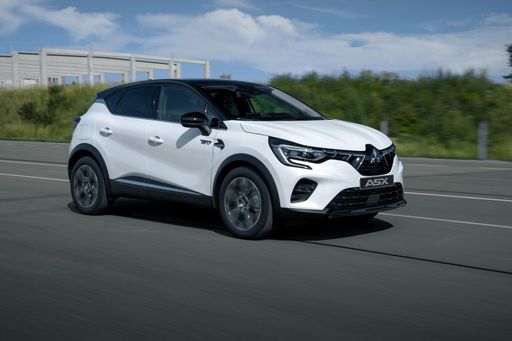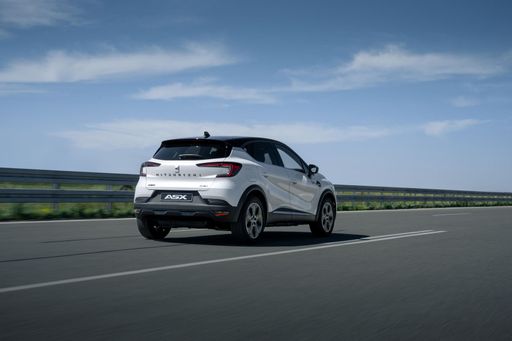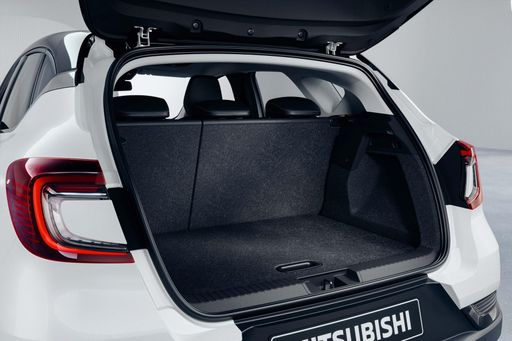Hyundai Bayon vs Mitsubishi ASX - Differences and prices compared
Compare performance (100 HP vs 158 HP), boot space and price (20100 £ vs 20600 £) at a glance. Find out which car is the better choice for you – Hyundai Bayon or Mitsubishi ASX?
Costs and Efficiency:
Price and efficiency are often the first things buyers look at. Here it becomes clear which model has the long-term edge – whether at the pump, the plug, or in purchase price.
Hyundai Bayon has a hardly perceptible advantage in terms of price – it starts at 20100 £, while the Mitsubishi ASX costs 20600 £. That’s a price difference of around 505 £.
Fuel consumption also shows a difference: Mitsubishi ASX manages with 4.40 L and is therefore noticeable more efficient than the Hyundai Bayon with 5.40 L. The difference is about 1 L per 100 km.
Engine and Performance:
Under the bonnet, it becomes clear which model is tuned for sportiness and which one takes the lead when you hit the accelerator.
When it comes to engine power, the Mitsubishi ASX has a distinct edge – offering 158 HP compared to 100 HP. That’s roughly 58 HP more horsepower.
In acceleration from 0 to 100 km/h, the Mitsubishi ASX is distinct quicker – completing the sprint in 8.50 s, while the Hyundai Bayon takes 11.30 s. That’s about 2.80 s faster.
In terms of top speed, the Mitsubishi ASX performs minimal better – reaching 180 km/h, while the Hyundai Bayon tops out at 179 km/h. The difference is around 1 km/h.
There’s also a difference in torque: Mitsubishi ASX pulls noticeable stronger with 270 Nm compared to 200 Nm. That’s about 70 Nm difference.
Space and Everyday Use:
Whether family car or daily driver – which one offers more room, flexibility and comfort?
Both vehicles offer seating for 5 people.
In curb weight, Hyundai Bayon is to a small extent lighter – 1170 kg compared to 1296 kg. The difference is around 126 kg.
In terms of boot space, the Mitsubishi ASX offers slightly more room – 484 L compared to 411 L. That’s a difference of about 73 L.
In maximum load capacity, the Mitsubishi ASX performs noticeable better – up to 1596 L, which is about 391 L more than the Hyundai Bayon.
When it comes to payload, Hyundai Bayon minimal takes the win – 465 kg compared to 449 kg. That’s a difference of about 16 kg.
Who comes out on top?
Overall, the Mitsubishi ASX shows itself to be leaves the rival little chance and secures the title of DriveDuel Champion.
It convinces with the more balanced overall package and proves to be the more versatile choice for everyday use.

Mitsubishi ASX
Costs and Consumption
View detailed analysis
Engine and Performance
View detailed analysis
Dimensions and Body
View detailed analysis
Hyundai Bayon
The Hyundai Bayon slips neatly between city runabout and small SUV, offering surprising practicality and a fresh, confident design that stands out in urban traffic. It's an easy buy for shoppers who want smart packaging, tidy handling and a dash of personality without fuss — a sensible little crossover that makes everyday driving a bit more enjoyable.
details




Mitsubishi ASX
The Mitsubishi ASX is a compact crossover that mixes practicality with a no-nonsense personality, making it an easy choice for buyers who want sensible space without the showroom theatrics. It won't set your pulse racing, but its composed ride and user-friendly kit make it a dependable companion for daily errands and weekend escapes — reliable rather than flashy.
details




|

|
|
|
|
Costs and Consumption |
|
|---|---|
|
Price
20100 - 25800 £
|
Price
20600 - 32500 £
|
|
Consumption L/100km
5.4 - 5.5 L
|
Consumption L/100km
4.4 - 6 L
|
|
Consumption kWh/100km
-
|
Consumption kWh/100km
-
|
|
Electric Range
-
|
Electric Range
-
|
|
Battery Capacity
-
|
Battery Capacity
-
|
|
co2
124 g/km
|
co2
99 - 135 g/km
|
|
Fuel tank capacity
40 L
|
Fuel tank capacity
48 L
|
Dimensions and Body |
|
|---|---|
|
Body Type
SUV
|
Body Type
SUV
|
|
Seats
5
|
Seats
5
|
|
Doors
5
|
Doors
5
|
|
Curb weight
1170 - 1195 kg
|
Curb weight
1296 - 1493 kg
|
|
Trunk capacity
411 L
|
Trunk capacity
348 - 484 L
|
|
Length
4180 mm
|
Length
4239 mm
|
|
Width
1775 mm
|
Width
1797 mm
|
|
Height
1500 mm
|
Height
1575 mm
|
|
Max trunk capacity
1205 L
|
Max trunk capacity
1458 - 1596 L
|
|
Payload
460 - 465 kg
|
Payload
397 - 449 kg
|
Engine and Performance |
|
|---|---|
|
Engine Type
Petrol
|
Engine Type
Petrol, Petrol MHEV, Full Hybrid
|
|
Transmission
Manuel, Automatic
|
Transmission
Manuel, Automatic
|
|
Transmission Detail
Manual Gearbox, Dual-Clutch Automatic
|
Transmission Detail
Manual Gearbox, Dual-Clutch Automatic, Automatic Gearbox
|
|
Drive Type
Front-Wheel Drive
|
Drive Type
Front-Wheel Drive
|
|
Power HP
100 HP
|
Power HP
91 - 158 HP
|
|
Acceleration 0-100km/h
11.3 - 12.4 s
|
Acceleration 0-100km/h
8.5 - 14 s
|
|
Max Speed
176 - 179 km/h
|
Max Speed
168 - 180 km/h
|
|
Torque
172 - 200 Nm
|
Torque
160 - 270 Nm
|
|
Number of Cylinders
3
|
Number of Cylinders
3 - 4
|
|
Power kW
74 kW
|
Power kW
67 - 116 kW
|
|
Engine capacity
998 cm3
|
Engine capacity
999 - 1789 cm3
|
General |
|
|---|---|
|
Model Year
2024
|
Model Year
2024 - 2025
|
|
CO2 Efficiency Class
D
|
CO2 Efficiency Class
D, C
|
|
Brand
Hyundai
|
Brand
Mitsubishi
|
What drivetrain options does the Hyundai Bayon have?
The Hyundai Bayon is available as Front-Wheel Drive.
The prices and data displayed are estimates based on German list prices and may vary by country. This information is not legally binding.
